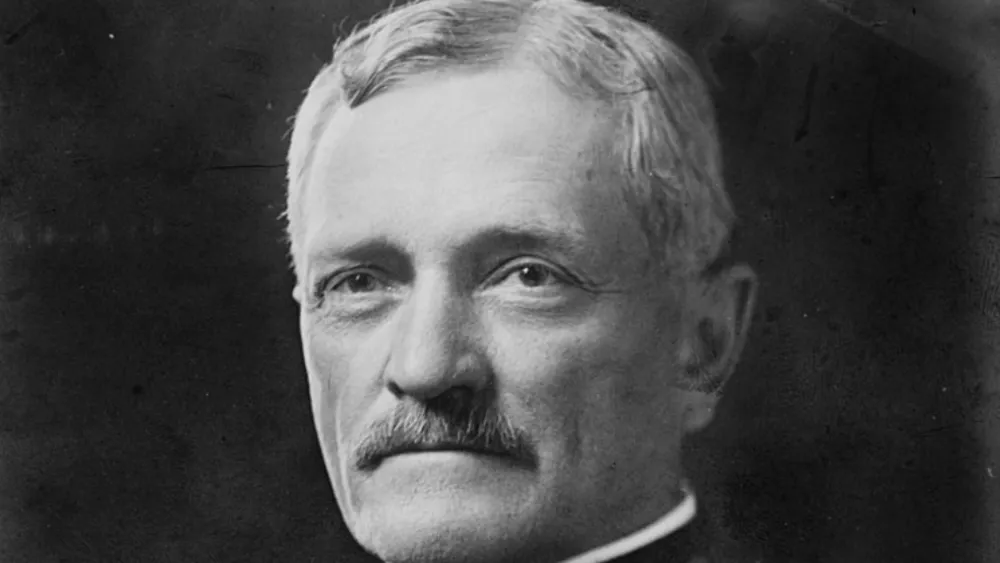John Joseph Pershing is a legendary figure in American military history. Nicknamed “Black Jack” due to his early leadership of African American troops and his black uniform as a West Point instructor, Pershing’s rise through the ranks of the U.S. Army is a tale of perseverance, discipline, and visionary leadership. His command of the American Expeditionary Forces (AEF) during World War I shaped the course of the conflict and left an enduring mark on the U.S. military.
In this blog, we delve into Pershing’s early life, his steady military ascent, and his transformative role in World War I. We’ll also examine the legacy he left behind—one that still echoes through the halls of military history.
Humble Beginnings in Missouri
John Joseph Pershing was born on September 13, 1860, near Laclede, Missouri. The son of a general store owner and postmaster, Pershing spent his childhood working on the family farm and attending a local school in rural Missouri. The difficulties of frontier life shaped his early character. As the eldest of six children, Pershing learned responsibility at a young age, often helping his father with business affairs and managing farm duties.
His mother, Ann Elizabeth Thompson, strongly believed in the importance of education, and her influence encouraged him to strive beyond the confines of rural life. The values of discipline, hard work, and perseverance that he absorbed during these early years would come to define his leadership style.
The economic hardships and post-Civil War environment of Missouri were also instrumental in shaping Pershing’s worldview. Living in a region still recovering from the war’s aftermath, he observed firsthand the impact of conflict on individuals and communities. These experiences fostered an understanding of both the devastation of war and the value of unity. Laying the foundation for the leadership skills he would later hone.
A Determined Pursuit of Education
Pershing attended the State Normal School in Kirksville (now Truman State University), where he graduated with a degree in education. His early career included teaching at a local African American school, where he was exposed to issues of racial inequality. His willingness to take this position reflected his commitment to equality and his resolve to serve others, regardless of societal norms. While Pershing wasn’t outspoken politically, his service in a segregated school system planted seeds of awareness about justice and fairness.
In 1882, Pershing achieved a pivotal milestone: his appointment to the United States Military Academy at West Point. This was a major accomplishment for a young man from humble beginnings. Additionally, it marked the beginning of a remarkable military career.
At West Point, Pershing stood out for his discipline and leadership abilities. Though not at the top of his class academically, he earned the respect of both classmates and instructors. He graduated in 1886, ranked 30th in a class of 77, and was immediately commissioned as a second lieutenant in the U.S. Army.
The Early Military Career of John Joseph Pershing
Following graduation, Pershing served in the American Southwest and participated in various campaigns against Native American tribes, including the Apache Wars. These early assignments were grueling and often dangerous, but they gave Pershing valuable field experience. He was admired for his calm demeanor, attention to detail, and ability to lead under pressure.
Later, he was assigned to the 10th Cavalry Regiment—one of the original Buffalo Soldier units composed of African American troops. His association with the 10th Cavalry earned him the nickname “Black Jack,” originally intended as a racial slur but later transformed into a badge of honor. Pershing embraced the role and earned the respect of the soldiers he commanded. His time with the Buffalo Soldiers shaped his inclusive approach to leadership and underscored his belief in meritocracy over racial bias.
In addition to field commands, Pershing returned to West Point as a tactical officer and instructor. There, he influenced the next generation of Army leaders and refined his philosophy on training, discipline, and military professionalism.
Commanding in the Spanish-American War and the Philippines
Pershing’s career advanced rapidly during the Spanish-American War (1898). He served with distinction in Cuba at the Battle of San Juan Hill and was cited for bravery. Following that, he was stationed in the Philippines during the Philippine-American War, where he led troops in campaigns against the Moro tribes.
His Philippine assignment was particularly significant. Unlike many officers who used brute force, Pershing adopted a more diplomatic and strategic approach. He respected the local culture, learned the language, and worked to gain the trust of tribal leaders. His ability to combine military strength with cultural sensitivity helped him manage complex insurgencies—an experience that would later prove invaluable in World War I.
A Sudden Promotion and Rising Fame
By the early 1900s, Pershing’s reputation as a capable officer had spread across military circles. In 1905, President Theodore Roosevelt promoted Pershing from captain to brigadier general, bypassing over 800 officers. This extraordinary leap in rank was based not only on his combat record but also on his leadership potential.
Pershing’s next assignments included observing military campaigns in Japan and serving as a military attaché in Europe. His global exposure gave him critical insights into foreign military strategies and emerging technologies—knowledge that would serve him well when the U.S. entered World War I.
Tragically, in 1915, while serving along the Mexican border during the Pancho Villa expedition, Pershing suffered a personal loss when a fire at the Presidio in San Francisco killed his wife and three daughters. This devastating event deeply affected him. Yet, true to his stoic character, Pershing channeled his grief into his military duties with even greater focus.

World War I: The American Expeditionary Forces
When the U.S. declared war on Germany in 1917, President Woodrow Wilson appointed John J. Pershing as the Commander of the American Expeditionary Forces (AEF). This role presented unprecedented challenges: the U.S. had to rapidly expand and mobilize its army, ship troops across the Atlantic, and integrate into an already complex war being waged by European powers.
Pershing’s most significant decision was to maintain the independence of American forces. Allied commanders wanted American troops absorbed into British and French units, but Pershing insisted on forming a separate American command. He believed that American soldiers should fight under their own flag, following American strategies and leadership.
This decision preserved U.S. military identity and morale, even though it delayed deployment. When American troops finally joined the front lines in significant numbers in 1918, they made a decisive impact. Under Pershing’s leadership, the AEF won crucial victories in the Battle of Saint-Mihiel and the Meuse-Argonne Offensive. That was one of the largest and deadliest battles in American military history.
Pershing demonstrated brilliance in logistics, coordination, and battlefield command. Despite heavy losses, the AEF’s contributions helped break the stalemate on the Western Front and hasten the end of the war.
Post-War Honors and Continuing Legacy
After the armistice in November 1918, Pershing returned to the U.S. a national hero. He was celebrated with parades, honors, and public admiration. In 1919, he published his memoir, My Experiences in the World War, which won the Pulitzer Prize for History.
In 1919, Congress awarded Pershing the rank of General of the Armies, the highest possible rank in the U.S. Army. Only George Washington shared that distinction. In fact, when the rank was reconfirmed for Washington in 1976, it was stipulated that he would remain senior to all other U.S. military officers past or present—including Pershing—affirming both men’s towering legacies.
After retiring from active service in 1924, Pershing remained an influential figure. He played a key role in founding the American Legion, an organization committed to supporting war veterans. He also served on military boards and advisory committees, shaping policy and mentoring younger leaders.
A Life of Service and Enduring Symbolism
John J. Pershing passed away on July 15, 1948, and was buried with full honors at Arlington National Cemetery. His funeral was attended by top military and political leaders, reflecting the immense respect he earned throughout his life.
More than a general, Pershing was a symbol of principled leadership. He represented an era when the United States emerged as a global military power, and his actions on the battlefield directly contributed to that transformation. His insistence on preparation, discipline, and accountability made the AEF a respected force among the Allies and feared by the Central Powers.
The General Who Shaped Victory
John J. Pershing’s life and legacy stand as a testament to what can be achieved through perseverance, service, and unshakable dedication to one’s nation. From humble Missouri roots to commanding millions of soldiers on the world stage, Pershing exemplified the core values of leadership, honor, and courage.
His decisions during World War I not only helped bring victory to the Allies but also established the foundation for America’s role in global security. As a teacher, commander, strategist, and patriot, Pershing’s influence shaped the U.S. military’s modern identity.
Generations later, his name continues to inspire respect, not just for what he accomplished, but for how he did it—with discipline, integrity, and an enduring commitment to the ideals of service.











